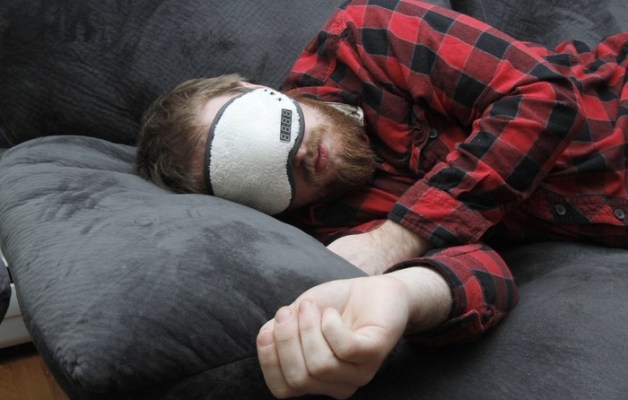Is this the year of the sleep mask? Napwell thinks so. The Boston-based company is creating a napping mask that allows you to grab some shut-eye and wake up gently as lights inside the mask slowly rouse you from your slumber.
The device lets you set a nap duration and then nod off. Once you reach the end of your nap the mask slowly lights up with a diffuse, calming light that simulates sunrise. The creators, Justin Lee, an MIT Ph.D candidate, and Neil Joglekar, late of Stanford, see this as a napping tool that can help users become more energized at work, sleep better on planes, or establish a new sleeping plan. Lee says the mask will prevent “sleep inertia” – the groggy feeling you get after waking up suddenly.
“Our goal is to build products that help people lead efficient and productive lives,” he said. “We started with the problem and not the solution. We felt we found the most pressing need – helping people sleep more efficiently. We experimented with multiple products, but after speaking to many friends and experts we realized that a simple, mobile solution to sleep was necessary. We don’t mean mobile in the sense of an app, but rather something that can be used on the go. We were actually excited to build a solution to this problem that did not rely on computers or phones.”
Lee said that the Napwell is far more portable than other sleeping masks and doesn’t think it compares to the IntelClinic NeurOn in that the built-in interface makes it easy to use anywhere. “The mask is battery operated so you don’t need WiFi, Bluetooth, or a smartphone to make it work. This goes back to our philosophy of building products so that they can be used by anyone, anywhere,” he said. “I consider myself lucky to work with amazing people at MIT and Harvard Medical School, but it really frustrates me to see my colleagues routinely hampered by small things that have dramatic effects on their productivity. What started as a set of personal projects to help my colleagues (and myself as well) with these minor hurdles has evolved into a larger push to develop products that can help the wider population lead more efficient and productive lives.”
The team is looking into further expanding their portfolio of health-related devices. The Napwell starts at $50 for a production unit and will ship in September. They’re aiming for $30,000 in funding.
“While we think there is great potential in sleep, the Napwell is just our first product. We see napping as a significant pain point but also an introduction to making a retail product at scale.”
